- Home
- Cynthia Ozick
Critics, Monsters, Fanatics, and Other Literary Essays Page 5
Critics, Monsters, Fanatics, and Other Literary Essays Read online
Page 5
But only a few months after my novel was published, Chambers’ status in history underwent a drastic change. The Hiss case broke upon the world and Chambers became beyond any doubt a historical figure.
The notoriously controversial espionage trial of Alger Hiss turned on Chambers’s testimony from his knowledge of the Communist underground. The issue was treason, and Hiss, a disarming and plausibly earnest former State Department official who had once been a protégé of Justice Felix Frankfurter, was convicted of perjury, while Chambers was everywhere roundly vilified as a disreputable conspirator and liar favored by Nixon and the redbaiting Senator McCarthy. But what concerned Trilling, both in the unfolding of his novel and in the bitter polemics of his later reflections on it, was the obstinate reluctance of virtue-minded progressives to accept the facts of Stalinist perfidy. “At this distance in time,” he wrote in 1975, “the mentality of the Communist-oriented intelligentsia of the Thirties and Forties must strain the comprehension even of those who, having observed it at first hand, now look back upon it, let alone of those who learn about it from such historical accounts of it as have been written. That mentality was presided over by an impassioned longing to believe. . . . Once the commitment to belief had been made, no evidence might, or could, bring it into doubt. Whoever ventured to offer such evidence stood self-condemned as deficient in good will.” These few sentences, written in hindsight, still carry the fury of Trilling’s aim in The Middle of the Journey: to expose what he deemed the hollowness of those middle-class fellow travelers—“radical intellectuals, and those who did not claim that epithet but modestly spoke of themselves as liberal or progressive or even only democratic”—who denied “the reality which lay behind the luminous words of the great promise.”
In Trilling’s scheme of moral accountability they are Arthur and Nancy Croom, a goodhearted, do-gooding young couple summering in the country. The Crooms invite their friend John Laskell, who has nearly died from a devastating illness, to recuperate in their pastoral village. Gifford Maxim arrives to join the little group, though he is unwelcome: the Crooms despise and condemn him as a doctrinal deserter. An ideological conflict erupts over the death, through her father’s drunken blow, of a fragile neighborhood child. The liberal Crooms have always sympathized with Duck, the ne’er-do-well father, frequently hiring him for odd jobs on their property. Unreliable as he may be as a man, he is nevertheless a poor and ill-spoken laborer, a victim of his class in an indifferent society; it is the flaws of society that have made him what he is. As Arthur frames it, “social causes, environment, education or lack of education, economic pressure, the character-pattern imposed by society, in this case a disorganized society, all go to explain and account for any given individual’s action.” Then Nancy: “It’s not his fault,” she cries out in Duck’s defense, appalled by his careless brutality to the child yet unwilling, like Arthur, to assign guilt or blame; unwilling also to let the man return to the work he needs. “But I couldn’t stand him around me. I’d think of it all the time. I couldn’t stand seeing him. And yet it’s not his fault, it’s not.” To which Maxim, the repentant Communist who has repudiated social determinism, replies, “In my system there is one thing your system lacks. In my system, although there is never-ending responsibility, there is such a thing as mercy.” He goes on:
Duck can be forgiven. I can forgive him because I believe that God can forgive him. You see, I think his will is a bad one, but not much more, not different in kind from other wills. And so you and I are opposed. For you—no responsibility for the individual, but no forgiveness. For me—ultimately absolute responsibility for the individual, but mercy. Absolute responsibility: it is the only way that men can keep their values, can be thought of as other than mere things. These matters that Arthur speaks of—social causes, environment, education—do you think they really make a difference between one human soul and another? In the eyes of God are such differences of any meaning at all?
The Crooms are horrified—has Maxim turned insane? This is religious talk; it veers into crazy mysticism. Laskell, renewed and illuminated, finds a middle path between Maxim’s fevered metaphysics and the Crooms’ empty detachment from individual culpability. And when he parts from the Crooms, it is in relief and disillusionment: their friendship is at an end.
The Middle of the Journey is a very good novel, far superior to how it has long been rated. As a political novel, it has not grown stale; the politics of belief are with us still. As a novel of ideas, and of elastic characterization and freely flowing incident, it keeps clear of positions held by pasteboard symbols masking as persons. Laskell’s engagement with Duck’s little daughter is deft and intimate, throwing off glints of teasing charm. Eros makes its unexpected appearance on a riverbank. Gestures and conversations ring true. And overall, the tone is level and sober, reflecting an invalid’s fatigued notice as Laskell reawakens to sharper seeing—observation becoming revelation. A good novel, then; even a very good novel; but subjected to scorn by Trilling’s contemporaries, and not yet escaped from their judgment. “The attack on my novel,” he recorded—it was a lasting resentment—“that it is gray, bloodless, intellectual, without passion, is always made with great personal feeling, with anger.—How dared I presume?”
As Trilling saw it, what was being questioned was his right to be a novelist at all. His determination to become one was regarded as impermissible literary transvestism. He had made his reputation as an essayist, a thinker, an inquirer into the nature of culture. Lawrence, Conrad, Mann, Kafka, Orwell, and Matthew Arnold were among his touchstones. His groundbreaking studies of novelists took in (in The Liberal Imagination alone) Henry James, Sherwood Anderson, Mark Twain, Theodore Dreiser, Rudyard Kipling, and F. Scott Fitzgerald; a longer work was given over solely to E. M. Forster. In an essay of provocative psychological audacity, he dared to say of Jane Austen, “She is the first to be aware of the Terror which rules our moral situation. . . . She herself is an agent of Terror.”
All these unflinching critical sentiments were distinguished by a recognition of the link between feeling and what Trilling construed as “reality,” whose always perilous shadow was illusion. “It can be said,” he wrote, “that all prose fiction is a variation on Don Quixote. Cervantes sets for the novel the problem of appearance and reality: the shifting and conflict of social classes becomes the field of the problem of knowledge, of how we know and how reliable our knowledge is.” Elsewhere he defined fiction as carrying “the cultural assumptions that make politics,” and he was willing to subsume gossip under politics, and vice versa. In brief: more than anyone in his generation, Trilling had penetrated into the secret workings of The Novel: he knew it, he understood it, as an evolving, breathing, expanding, connecting social organism. Then surely it behooved him to bring forth not merely a good novel, and not merely a very good novel, but a great novel? This he had not done. QED: since with all this capacity for greatness he had not produced a great novel, it must follow that he had produced a bad novel—gray, bloodless, intellectual, without passion. For the lauded critic who stakes his truth on a transcendent standard, there may be a lesson in it: do not try to practice what you preach, or your admirers will gather round to pick your bones.
The Middle of the Journey, despite its variegated successes, was in fact not nearly a great novel. Nor could it have been, and for a reason that cannot be laid at Trilling’s feet: he wrote too soon. In 1947 the smell of executions in the cellar of Moscow’s Lubyanka prison, headquarters of the KGB, had not yet risen to the nostrils of the world. He was compelled to write abstractly of evils that were revealed viscerally only much later. If the fearful idea of a death warrant inflamed the novelist’s intent, it went beyond any threat to the American life of Gifford Maxim. Trilling could readily vivify those progressive intellectuals who spurned the reality behind “the luminous words of the great promise”—they were in his immediate circle. Of the brutish reality itself he could speak, in or out of fiction, only in the screening languag
e of news items, of “politics”: purges, show trials, espionage, the Hitler-Stalin pact. What came to be called the Great Terror would have to wait for its definitive exposure by a novelist who had endured it. Not until the publication in the West, in 1968, of Aleksandr Solzhenitsyn’s The First Circle, and of The Gulag Archipelago in 1973, was the human suffering inflicted by the Gulag finally and universally assimilated by its doubters and skeptics.
But even before then—for those who, like Trilling, had eyes to see—it was possible to comprehend the lineaments of that suffering, in particular through the reports and testimonies of Koestler, Souvarine, Silone, Akhmatova, Orwell, Pasternak, and many others. From writers such as these, Trilling could deduce the primal ruthlessness of the Soviet system: he could deduce it, he could infer it, but he could not disinter it—not in the darker corridors of the fictive imagination (as in House of Meetings Martin Amis would, sixty years on, when the brokenness and the heinousness had long been laid incontrovertibly and bloodily bare). Inference is distanced cognition, not a cudgel, and Trilling’s theme in The Middle of the Journey was nothing if it was not the reality of the cudgel. The mind that had uncovered terror in so seemingly pacific a source as Mansfield Park was prevented by simple chronology from closer, more fleshly knowledge of the conditions of the Gulag.
Still, it is reasonable to ask, if Trilling had known, with the completeness of a later time, the violently corporeal conditions of the Gulag, could he have done them—done them, that is, novelistically? Would he have had the blood, the passion, the death warrant in his pocket?
This is not a question that will ever be answered. He did not again approach, in fiction, a subject that intimated physical cruelty on a large scale, invoking the anguish of whole populations. To those who disparaged his novel, and to the few who regretted its failure, the letdown for Trilling appeared to be so complete that it must clearly choke off any future attempt at a sustained fiction. His was the cautionary tale of the critic who had published a handful of short stories and a single novel, which, justifiably, had no successor. As a literary thinker he was preeminent. As a novelist he was beaten.
But he was not beaten. “How dared I presume?” was not, as it turned out, the cry of defeat it looked to be; it was the herald of renewed ambition. Another novel—a second one—was under way, though it may have begun earlier, as a first novel. In any event, Trilling was wholeheartedly preoccupied with it in the years following the unhappy reception of The Middle of the Journey. Disappointment spurred him: in a letter to Richard Chase, a Columbia colleague, he confided that he hoped for a “richer, less shaped, less intellectual, more open” work. “I think the next one will be better,” he said. Chastened yet emboldened, he confessed to his journal, “There comes an impulse to take myself more seriously, for although measured against what I admire I give myself no satisfaction, yet against what I live with I have something to say and give and might really interest myself—and all this gives to the novel a new validity—the notion is right and I begin to see it substantively.”
Six decades were to pass before we were permitted to learn of this novel’s existence. Untitled, it was left unfinished—cast out midway, after twenty-four chapters and a hundred and fifty pages. News of it has erupted like a secret exploding; yet all along it was hiding in plain sight in Columbia’s Trilling archive. Columbia University Press has now brought it out as The Journey Abandoned, with a valuable introduction by Geraldine Murphy, the Trilling scholar who uncovered it, and who serves as its impeccable editor. And though Trilling had vowed a departure from the “intellectual,” the new work was inevitably more so, since a number of its characters derived from the fevered arena of literary high culture. At the same time, and contrary to his hopes, Trilling’s second venture was more enclosed than the first, where politics had led outward to intimations of the great world and its deadly upheavals. But the progress of Victor Hammell, the ambitious young biographer who is its hero, takes him largely into intricately internalized psychological musings. Professor Murphy’s edition includes a preface by Trilling, or what she has chosen to present as a preface. To forestall easy mockery (“Henry James had the forbearance to finish a novel before writing its preface,” for instance), one ought to consider Trilling’s two opening sentences: “I am sure there is no need for me to explain why I do not want to make a precise formulation of my novel so early in the game. A novel must eventually be conceived through its writing even more than through its originating idea and an abstract statement of the story’s impulses at this point might well freeze them and make them useless.” Like any preface, this has a public voice—but it may also be the kind of explanatory statement that accompanies an inquiry to a publisher. Whether the manuscript ever fell under a publisher’s eye apparently remains unknown. Nevertheless, to attach the term “preface,” with its Jamesian reminders, to Trilling’s searching reflections and suppositions is exactly right. It is James who presides over Trilling’s aspiration; it is James whom he consciously summons, and who serves as his cicerone and mentor. During the period when Trilling was seriously at work on the novel, he was also writing an introduction to The Princess Casamassima, and it was here that he set down what must be regarded as his novel’s true preface:
The Princess Casamassima belongs to a great line of novels which runs through the nineteenth century as, one might say, the very backbone of its fiction. These novels, which are defined as a group by the character and circumstance of their heroes, include Stendahl’s The Red and the Black, Balzac’s Père Goriot and Lost Illusions, Dickens’ Great Expectations, Flaubert’s Sentimental Education; only a very slight extension of the definition is needed to allow the inclusion of Tolstoy’s War and Peace and Dostoyevsky’s The Idiot.
The defining hero may be known as the Young Man from the Provinces. He need not come from the provinces in literal fact, his social class may constitute his province. But a provincial birth and rearing suggest the simplicity and the high hopes he begins with—he starts with a great demand upon life and a great wonder about its complexity and promise. He may be of good family but he must be poor. He is intelligent, or at least aware, but not at all shrewd in worldly matters. He must have acquired a certain amount of education, should have learned something about life from books, although not the truth.
This, fully elaborated, was Trilling’s new theme, and also its line of literary descent. The idea appears again in the unfinished work’s preface (the characterization we are obliged to use). “Think of him,” he says of Vincent Hammell,
as practical, energetic, not a dreamer or a mooncalf. He has real talent and he does not have the mechanical “shyness” of a sensitive young hero; indeed, one of the notable things about him is his active charm. He has what in a young man passes for maturity. He is decent, generous; but he is achingly ambitious. He has considerable insight into the conditions of his society, he wishes to be genuine, a man of integrity; yet he also wishes to be successful. His problem is to advance his fortunes and still be an honest man. He is conscious of all the dangers; he is literate and knows the fates of Julian Sorel, of Rastignac, of Frederic Moreau—all the defeated and disintegrated young men of the 19th century cycle of failure. He, for his part, is determined not to make their mistakes.
How much Trilling knows! He has already warned himself not to risk knowing too much, lest his story “freeze.” But his tone here is strangely after-the-fact—that of a critic who is discussing a recognizable character in an established novel he has frequently read with profit and appreciation. How can Vincent Hammell breathe and freely act if he is designed according to an acknowledged template, if he is swaddled in layers of social and psychological and literary preconceptions? A novelist must understand that one cannot imagine one’s characters—they must be at liberty to imagine themselves. And this too Trilling understood: understood so well that he took care to instruct his characters in how to observe and judge independently, thereby imprisoning them ever more deeply in his own mind.
Vincent Hammell is a character prescribed. Born in a small town in the Midwest, he is the son of an optometrist. The time is the 1930s; money is scarce. The world of opportunity and hope lies, and lures, elsewhere, and the means of attaining it is through the life of letters. Vincent is a literary aspirant who has already abandoned a work on “nothing less grandiose than a history of American literature in the latter part of the nineteenth century” (Trilling’s own field of scholarship, Professor Murphy notes). “I’m twenty-three,” he tells his mother despairingly, “and my fine success consists of a quarter-time job at the university, a couple of days a month for the Advertiser, oh yes, and the pleasure of instructing ladies . . . in creative writing. Quite a success.”
His release from these petty circumscriptions comes through an unexpected proposal from Harold Outram, the powerful director of the Peck Foundation. From a beginning as obscure as Vincent’s, Outram contrived to gain importance and acclaim in successive stages: first as a critic, then as a novelist esteemed as “one of the legends of the new American promise,” then as a radical agitator, then as an apostate from radicalism (a whiff of Whittaker Chambers again), then as the dean of a celebrated magazine (Chambers wrote for Time); and finally as the head of an influential cultural institution, the apogee of it all. But Vincent is cautioned against Outram by his former teacher, Teddy Kramer, a man “of such scrupulous intellectual honesty that he could bring no work to a satisfactory conclusion”—a trait Vincent equates with Kramer’s “Jewish pride.” “Let me tell you, Vincent,” Kramer warns, “you will see [in Outram] a man utterly corrupt.” According to Kramer, Outram is a danger and a sellout: he has abandoned literature’s sacred calling for worldly domination.

 Antiquities
Antiquities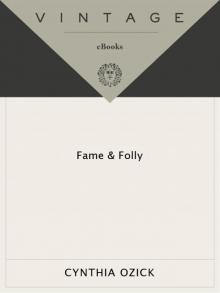 Fame & Folly
Fame & Folly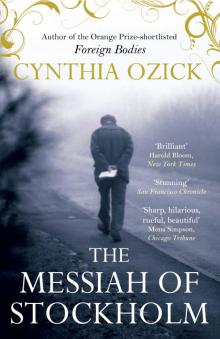 The Messiah of Stockholm
The Messiah of Stockholm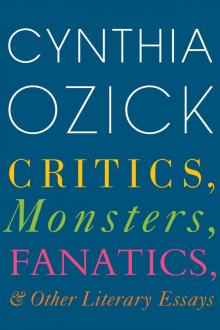 Critics, Monsters, Fanatics, and Other Literary Essays
Critics, Monsters, Fanatics, and Other Literary Essays Heir to the Glimmering World
Heir to the Glimmering World The Din in the Head
The Din in the Head Dictation
Dictation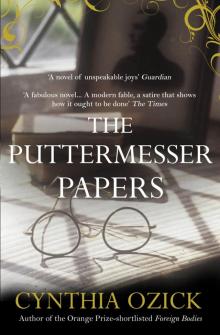 The Puttermesser Papers
The Puttermesser Papers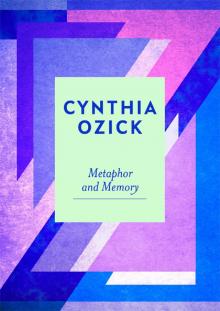 Metaphor and Memory
Metaphor and Memory Art and Ardor
Art and Ardor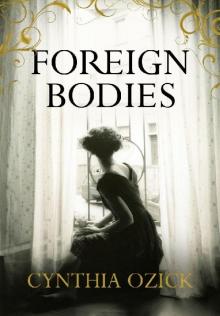 Foreign Bodies
Foreign Bodies Quarrel & Quandary
Quarrel & Quandary